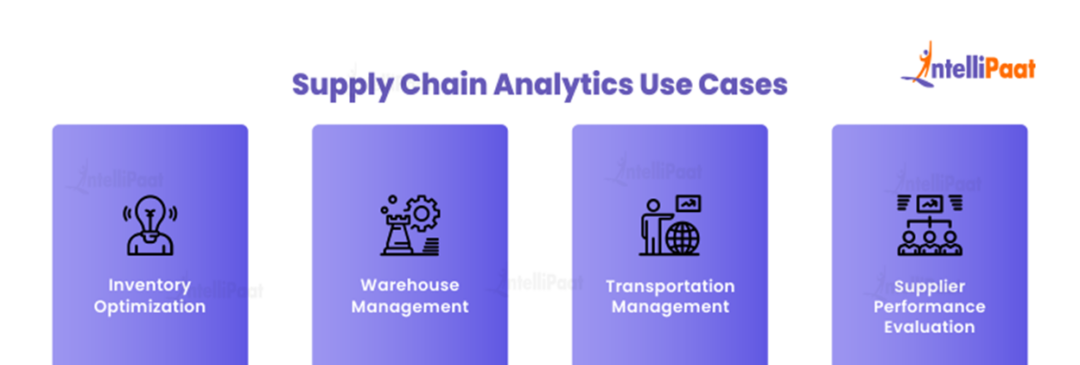What is Supply Chain Analytics?
An area of utmost importance is supply chain management as it plays a pivotal role in ensuring swift delivery of products to customers. In order to enhance supply chain efficiency businesses are increasingly turning to the power of supply chain analytics. The application of supply chain analytics serves to decipher this data, revealing concealed patterns and procuring invaluable insights.
Check out our YouTube video for a thorough description of how to begin a career in supply chain management.
{
“@context”: “https://schema.org”,
“@type”: “VideoObject”,
“name”: “How to Start a Career in Supply Chain Management”,
“description”: “What is Supply Chain Analytics?”,
“thumbnailUrl”: “https://img.youtube.com/vi/KB68lRLfQfQ/hqdefault.jpg”,
“uploadDate”: “2023-05-02T08:00:00+08:00”,
“publisher”: {
“@type”: “Organization”,
“name”: “Intellipaat Software Solutions Pvt Ltd”,
“logo”: {
“@type”: “ImageObject”,
“url”: “https://intellipaat.com/blog/wp-content/themes/intellipaat-blog-new/images/logo.png”,
“width”: 124,
“height”: 43
}
},
“contentUrl”: “https://www.youtube.com/watch?v=KB68lRLfQfQ”,
“embedUrl”: “https://www.youtube.com/embed/KB68lRLfQfQ”
}
Appendix
- Introduction to Supply Chain Analytics
- The Importance of Supply Chain Analytics
- Supply Chain Analytics Use Cases
- Essential Tools for Supply Chain Analytics
- Challenges in Supply Chain Analytics
- The Future of Supply Chain Analytics
- Conclusion
Introduction to Supply Chain Analytics
A supply chain is a group of people that exchange material, knowledge, or monetary resources with the objective of satisfying consumer requests. Companies that use data and analytics can acquire deep insights into their supply chain processes and make informed decisions to optimize operations.
Supply chain analytics refers to organizational techniques for analyzing and extracting value from large amounts of data associated with the acquisition, processing, and delivery of commodities. This is an essential component of supply chain management (SCM) since it provides critical insights about the complexities of the supply chain.
The Importance of Supply Chain Analytics
As the world’s markets persistently undergo a transformation, the demand for proficient and productive supply chain management has never been more pressing. The value of supply chain analytics in this complicated context cannot be overestimated, as it provides important conclusions that allow for better decision-making. The importance of supply chain analytics becomes obvious in various crucial fields.
Enhanced Visibility
Businesses may gain more visibility into all aspects of their supply chain operations, from procurement to transportation, warehousing, and distribution. All this by utilizing supply chain analytics. This augmented transparency empowers companies to pinpoint areas of inefficiencies, and prospects for enhancements. This will ultimately lead to a more systematic and cost-efficient supply chain.
Improved Forecasting
Through the utilization of historical data and advanced analytical methodologies, businesses can produce more precise demand and supply predictions. These refined forecasts provide companies with the capability to optimize inventory levels, diminish stockouts, overstocking, and heighten overall customer satisfaction.
Risk Mitigation
Supply chain analytics assist businesses in identifying and addressing potential supply chain disruptions by scrutinizing multiple risk factors. Better forecasts help companies manage their inventory more effectively so they can avoid situations where they have either too much or too little stock and this can lead to dissatisfied customers. By having a good handle on inventory levels, companies can improve customer satisfaction overall.
Increased Collaboration
Supply chain analytics establishes a data-driven basis for decision-making which fosters collaboration amongst various stakeholders, suppliers, manufacturers, distributors, and retailers. This elevated collaboration helps in better synchronization of objectives, and enhanced communication, and, ultimately, a more productive and efficient supply chain.
Supply Chain Analytics Use Cases

Supply chain analytics has numerous applications in a variety of industries. Let’s explore some of the most common use cases:
Inventory Optimization
Through analyzing past sales data and using advanced forecasting techniques, supply chain analytics help businesses manage their inventory levels effectively. This ensures that they have the right amount of inventory at the right time. This leads to lower occurrences of both stockouts and overstocks. This results in satisfied customers and reduced carrying costs.
Warehouse Management
Supply chain analytics can find ways for businesses to make their warehouses work better. This could mean making travel times shorter, using space more efficiently, or improving the way products are picked. By making these changes, companies can save money on warehousing and make their whole supply chain run better.
Transportation Management
Supply chain analytics can help businesses analyze their transportation data to find the most efficient and cost-effective routes for delivering their products. This can lead to faster delivery times, lower transportation costs, and happier customers.
Supplier Performance Evaluation
Supply chain analytics helps companies assess their suppliers’ performance in areas like delivering goods on time, product quality, and cost. This information allows companies to make better decisions about which suppliers to work with and how to manage those relationships. This, in turn, leads to a more dependable and cost-efficient supply chain.
Ready to take your supply chain operations to the next level? Gain in-demand skills with the experts-guided Logistics and Supply Chain Management Courses.
Essential Tools for Supply Chain Analytics
Businesses must have the necessary technologies in place to fully leverage the power of supply chain analytics. The following are some of the most popular and extensively used in supply chain analytics:
Data Warehousing Solutions
A data warehouse is similar to a large storage room where businesses save all of their vital data. This information might originate from a variety of sources and in a variety of formats. Special tools, such as Amazon Redshift, Google BigQuery, and Snowflake, assist businesses in organizing and analyzing big data. This is critical for supply chain analytics, which assists businesses in making better decisions regarding their supply networks.
Business Intelligence (BI) Platforms
Business intelligence (BI) systems such as Tableau, Power BI, and Looker enable companies to quickly visualize and understand their supply chain data. This makes it easy to identify trends, patterns, and areas for improvement. BI technologies also enable users to generate interactive dashboards and reports, making data-driven decisions across the organization much easier to make.
Advanced Analytics Solutions
Advanced analytical solutions such as R, Python, and SAS have become essential tools for businesses performing sophisticated data analysis. These techniques enable predictive modeling, machine learning, and optimization, resulting in very accurate forecasts. Furthermore, they assist firms in identifying potential dangers and reveal hidden opportunities within their supply chains. This makes them a vital asset for organizations wanting to maintain a competitive advantage in today’s data-driven world.
Challenges in Supply Chain Analytics

While supply chain analytics has various advantages, it is not without its limitations. The following are some of the most prevalent challenges that firms face while implementing supply chain analytics:
Data Quality and Integration
To generate meaningful insights, businesses require access to consistent, up-to-date, and high-quality data. However, the process of integrating data from multiple sources and guaranteeing its accuracy can be a challenging and lengthy endeavor.
Skill Gap
Effective supply chain analytics demands a distinctive blend of competencies, comprising proficiency in data analysis, supply chain management, and business intelligence(BI) tools. Numerous organizations face challenges in locating and retaining the skilled personnel essential for implementing and sustaining efficient supply chain analytics initiatives.
Cost and Complexity
Introducing an all-encompassing supply chain analytics solution can be a costly and intricate undertaking, especially for small and medium-sized businesses with constrained resources. Organizations must meticulously evaluate the expenses and advantages of investing in supply chain analytics to guarantee a favorable return on investment.
Consider working in supply chain management as a profession. Look at the supply chain management salaries.
The Future of Supply Chain Analytics
The relentless advancement of technology means the future of supply chain analytics is bright. The following are some of the most exciting developments in this field
Artificial Intelligence (AI) and Machine Learning
The ongoing progression of AI and machine learning algorithms imply that their implementation in supply chain analytics will keep expanding. These advancements possess the potential to transform supply chain management by automating intricate tasks, recognizing patterns and trends that may elude human perception, and empowering businesses to make more precise forecasts and decisions.
Internet of Things (IoT)
The Internet of Things (IoT) denotes a system of linked devices, sensors, and software that gather and share data. With an increasing number of devices being connected, the quantity of data open for analysis will surge exponentially. This data will furnish fresh perspectives on supply chain operations, permitting businesses to enhance their processes and amplify efficiency.
Blockchain Technology
The prospective influence of blockchain technology on supply chain analytics is substantial as it offers a secure, transparent, and decentralized approach to tracking goods and transactions throughout the supply chain. This augmented visibility and traceability can facilitate businesses in recognizing bottlenecks, guaranteeing the genuineness of their products, and diminishing the likelihood of fraud and counterfeit goods.
Conclusion
Supply chain analytics represents a potent instrument that businesses can utilize to refine their supply chain operations. Through the analysis of data from diverse sources, businesses can acquire insight into their inefficiencies and identify areas that require improvements. By implementing the proper tools and technology, businesses can augment their supply chain analytics capabilities and gain an edge in the dynamic and rapidly-evolving business environment of today.
You’re wondering something, aren’t you? If you post them on our Community page, we can solve issues in a beat!
The post What is Supply Chain Analytics? appeared first on Intellipaat Blog.
Blog: Intellipaat - Blog
Leave a Comment
You must be logged in to post a comment.








